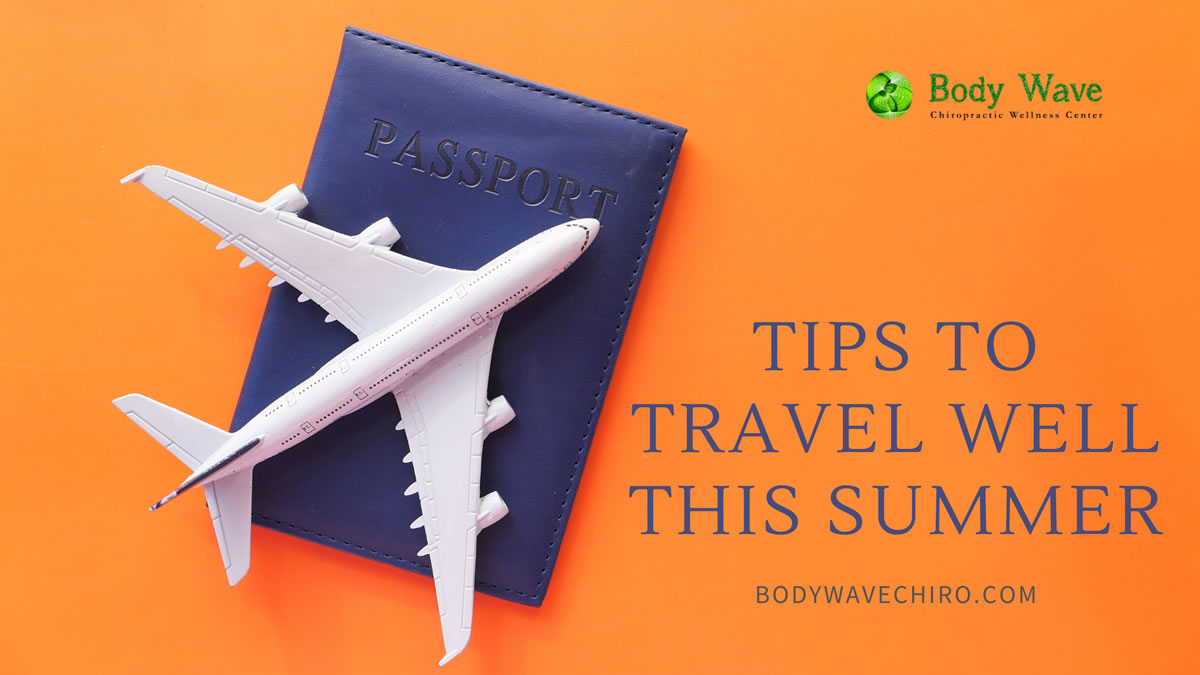
Hey Body Wave Community,
What have you been up to this summer?
Most of us have more travel going on, and travel tests our resilience. Adapting well to a new routine of diet, rest, and movement is a way to see how flexible your system is. Do you have the available energy to go with the flow as you sleep in weird beds, endure long car rides, and find dinner at a gas station? That extra demand can show in our weak links as neck pain, anxiety, or systemic stuff like irritable digestion or wakeful sleep.
Taking a long-term perspective: use travel as a litmus test to measure the health and resiliency of your nervous system. Build health so you do better, next summer and the years after. For a short-term perspective: here are a few things that help ease my travel stress – maybe they’ll help you too!
Prepare:
Imagine you’re training for your trip like you would for a triathlon. A few weeks before, pay extra attention to getting enough sleep, exercise, and healthy eating. Get into your chill zone as often as possible. Build a reserve that will help you adapt. I also love to clean my house before a trip, so I can come home and don’t feel like I’ve got a million things to catch up on.
Think about the little things that could support you. I bring an eye mask and ear plugs to help with sleep, a refillable water bottle, and simple high protein travel snacks so I’m not at the mercy of airport or gas station food. I’ll always have something to use for a low back support (in car and plane).
During:
Work in movement and travel breaks; flying or driving, change positions and move your spine as often as possible. Try and get 10 minutes of solid exercise in each morning before you start your day. This helps wake you up and balance blood sugar so you’re ready for what’s ahead.
- Stick to your regular sleep and wake cycles and meal times: your body’s enzymes and hormones are already dialed in to when you normally do things. Because you may not have a lot of time for self-care, take super-efficient breaks to reset nerve system stress:
- Simple breathing exercises (examples here).
- Alternating hot/ cold showers, as cold as you can take.
- Vagus nerve activation (helps you relax): gargle, hum, sing.
- Observe. Recognize when and where tension builds in your body, and breathe, move and stretch to help dissipate that energy. This is where the previous work you’ve done with Network Chiropractic should help: you’ve upgraded your system to self-regulate when tension gets high.
Recovery:
Plan for extra time to catch up, maybe an extra vacation day tacked on to the end for rest. I did not always do this: when I worked in Spain, I’d schedule flights to land in Madrid at 10 am and have office hours 4 hours later in Pamplona, bleary-eyed and jet-lagged (stressful, I don’t recommend it).
- Do exercise that works for you. I like a yin yoga session right when come home.
- Get adjusted (before and after) to drop that build-up of different stressors. Simply, it’s a powerful tool to help your body do its best work.
- Skip a meal, eat light at night, have lemon water. Simplify the input into your nervous system. Turn off music, podcasts, heavy meals, silence your phone and go dark for an evening. Usually on vacation we’ve overdone it, and this helps regulate our brain, blood sugar and sleep patterns.

I’ve got some travel ahead with 3 Network Chiropractic training seminars in the next couple months. I can’t wait – it’s my literal favorite topic to marinate in, and I’ll see friends and colleagues which will be great.
Thankfully, only one of these trips involves a flight. Thanks to my sister’s good advice, I just signed up for TSA precheck, so am excited to try that for the first time.
If there’s a travel hack you’d like to share, reply or leave it in the comments – I’m interested to hear what you’ve picked up over the years, too!
Stay healthy,
Dr. Laura
